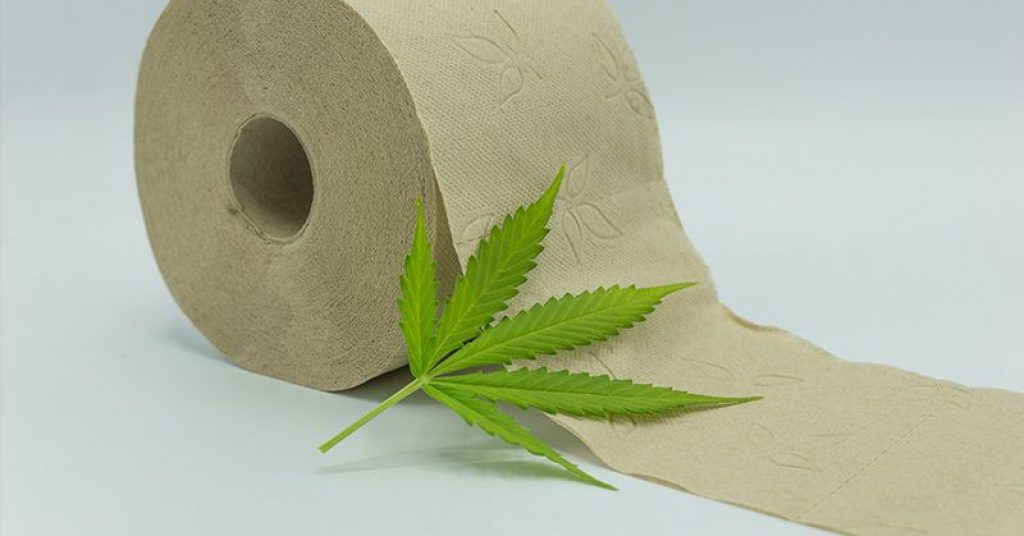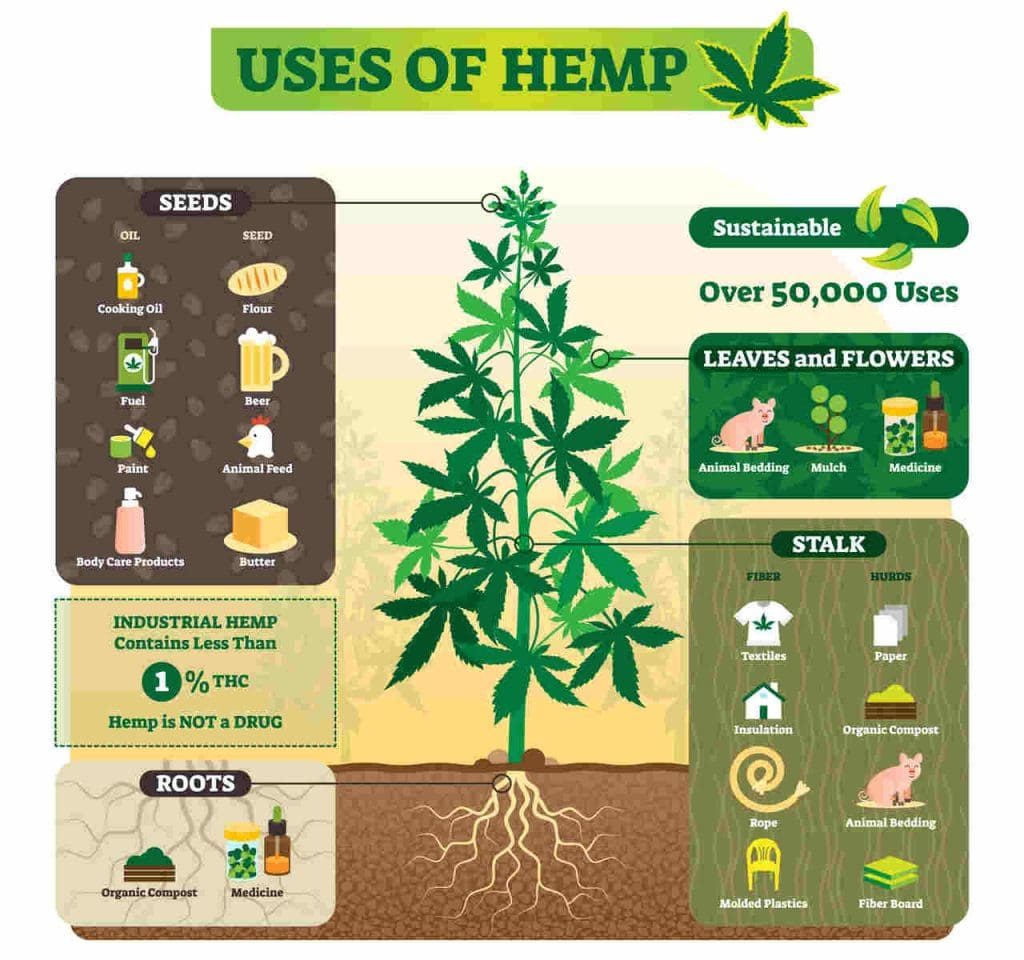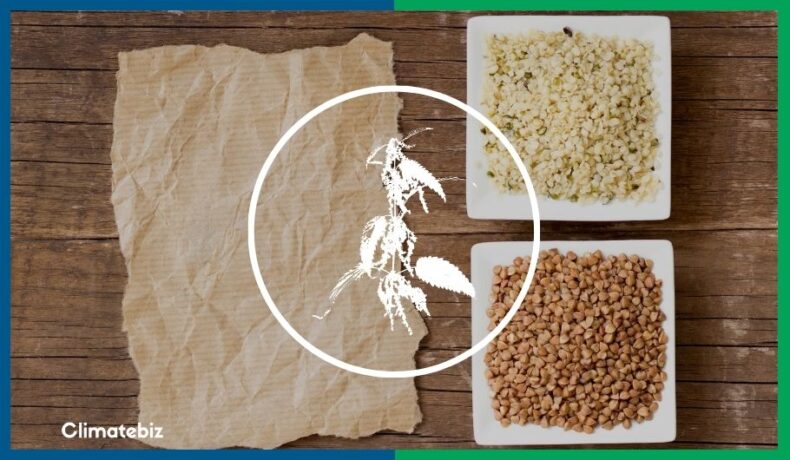Did you know that hemp toilet paper has antibacterial properties? We bet you didn’t.
Sadly, this comes down to the fact that many people aren’t very familiar with this eco-friendly product’s numerous properties and advantages. This is primarily due to the commercial sector’s refusal to adopt it (on a broad scale) for their and our benefit.
Nevertheless, we’ve decided to get behind this product and give it both the attention and recognition it deserves.
Honestly speaking, there’s a ton of value to learning about hemp toilet paper; from its exceptionally quick re-harvesting time to its habitat impact, and more!
Table of Contents
What is Hemp Toilet Paper?

Hemp toilet paper is similar to conventional toilet paper, except that, in this case, it is made entirely from hemp fibers extracted from the hemp plant.
How Is Hemp Toilet Paper Made?
The manufacturing process of conventional toilet paper is relatively long and toxic. Thankfully, the same cannot be said for manufacturing hemp toilet paper.
Here are the process phases:
Hemp Harvesting And Defibration
Let’s start with some botany, shall we?
Hemp stems are composed of 20% fibers; these are some of the strongest fibers out there!
These stems consist of an outer ring of long phloem fibers (bast) and an inner core of short xylem fibers (wood)
This inner core and its short xylem fibers (along with stem pith) are known as hemp hurds.
Once hemp is harvested, it goes through a process of defibration. Here, hurds are separated from fibers through techniques such as retting or decortication. These hurds are then used to help make tissue paper.
Pulping/Delignification
Kraft pulping (sulfate pulping) is the most widely used chemical pulping process for wood sources (softwood and hardwood).
This process uses harsh, toxic chemicals such as hydroxide and sodium sulfide (white liquor) to assist with separating lignin (lignin acts as a glue between fiber cells) from the fiber.
Fortunately, hemp can go through a more environmentally-friendly process: autohydrolysis in conjunction with enzymes is now a proven and efficient method for hemp fiber liberation, without the negatives associated with kraft pulping!
What Is Autohydrolysis?
Autohydrolysis is a process that uses water at a high temperature and pressure to break the bonds that link lignin, hemicellulose, and cellulose- all of which make up the chemical composition of hemp.
Bleaching
Hemp’s chemical composition and morphology, along with its generally lower lignin content, mean that lignin can be removed through a more environmentally-friendly process called oxygen delignification.
Oxygen delignification uses a mixture of sodium carbonate, high pressure, and high temperatures to remove lignin and bleach the hemp product.
Turning Pulp Into Toilet Paper
Finally, the pulp is flattened and dried into a thin sheet of tissue. This tissue is then turned into the toilet rolls that we use.
Hemp toilet paper is similar to conventional toilet paper, except that, in this case, it is made entirely from hemp fibers extracted from the hemp plant.
Is Hemp Toilet Paper Soft?
Absolutely!
What’s more, hemp toilet paper has the capacity to be even softer than conventional toilet paper.
NC State University discovered this while researching the Eco-friendly and innovative processing of hemp hurds fibers for tissue and towel paper.
One aspect of this article focused on the softness of tissue handsheets.
They concluded that “the hemp pulp resulted in improvements in the softness of tissue, among other things.
How Much Does Hemp Toilet Paper Cost?
Unfortunately, there aren’t very many places/websites that sell hemp toilet rolls. This means that we aren’t able to provide you with very accurate cost estimates.
But, from what we’ve seen, you can expect to pay anything from $0.10 – $0.50 per hemp toilet roll.
Why Are Hemp Toilet Rolls Not Readibly Available?
Hemp has always been associated (incorrectly) with the psychoactive compound, THC. This has made its adoption process far slower, which is a great pity.
Is Hemp Toilet Paper More Eco-Friendly?
Yes! In fact, this is one of hemp’s most significant claims to fame!
What Makes It Eco-Friendly?
Major factors that influence hemp toilet paper’s eco-friendliness include:
- Chemical composition and morphology: we’ve already touched on this one, but to reiterate; hemps chemical composition and morphology along with its lignin content mean that the defibrication and delignification processes can be carried out with more environmentally-friendly processes, such as oxygen- delignification.
- The amount of cellulose: industrial-grade hemp is made out of 50% to 77% cellulose. This means that it contains three times the amount of cellulose present in wood and other agricultural waste. Therefore, one hectare of hemp can produce four times the amount of paper that one hectare of wood can.
- Harvest rate: hemp has a much quicker re-harvest rate than conventional wood. It can be re-harvested after only four months of cultivation! Conversely, hardwood trees, such as eucalyptus, take 8-12 years of maturation before harvesting. Softwoods require even more time, between 20 to 80 years! Not exactly in a rush now are they?
How Long Does Hemp Toilet Paper Take To Biodegrade?
There is no conclusive scientific evidence available that points to hemp toilet roll degradation rates.
In fact, this research article shows that barely any attention has been given to understanding toilet paper fiber degradation.
What is worth noting, is that unbleached toilet paper does break down faster than bleached toilet paper and tissues.
A fair amount of hemp toilet rolls aren’t bleached. So with that in mind, it’s safe to say that hemp toilet rolls degrade faster than conventional toilet rolls.
5 Benefits Of Hemp Toilet Paper

Source: Hemp Foundation
Antibacterial Properties
Hemp has been shown to have antibacterial properties. A series of tests (yet to be published) carried out on hemp hurd to determine its antibacterial activity, showed strong antibacterial activity against E. coli.
Hemp’s constituents — cannabinoids, alkaloids, and other bioactive compounds of lignin — seem to be responsible for this outcome.
Water Absorption
Hemp can absorb large amounts of water — up to five times its own weight — thanks to its highly porous structure and strong capillarity effects inside the tubes.
This comes in handy, for reasons we don’t need to mention.
Less Chemicals
Generally speaking, hemp has a lower lignin content. This means the lignin requires far fewer (and less harsh) chemicals during this process.
Renewability
Hemp’s quick re-harvest rate (as little as 4 months). Additionally, hemp’s high cellulose level means that it can produce four times the amount of paper that one hectare of wood can.
Both traits make hemp an all-around more efficient toilet paper option than conventional toilet paper.
Habitat Impact
With that in mind, using a product like hemp toilet paper would incentivize hemp over traditional wood sources.
Final Thoughts
Hemp toilet paper is yet to gain the traction that it truly deserves. But we’re confident that it’s only a matter of time until this changes.
We recognize how difficult it still is to source this product, so if you have any leads, please share them in the comment section below!

